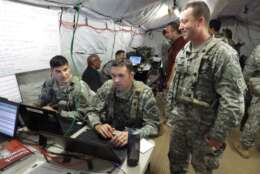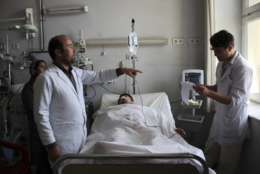Army
-
The Army has launched a four-month project to create a new "modernization command," and plans to have it fully functional by next summer.
October 10, 2017 -
The Army Materiel Command's Logistics Support Activity (LOGSA) has the task of aggregating that data to pinpoint the Army's logistics challenges.
October 05, 2017 -
The Army says the outcome of two studies shows the need to "pivot" to a new strategy for its tactical network.
September 28, 2017 -
The Army is just a few weeks into what’s likely to be one of the largest tactical IT upgrades in its recent history.
September 14, 2017 -
The U.S. Army is making plans to complete an upgrade project in two years that was estimated to take five, according to Col. Troy Crosby
September 13, 2017 -
The Army's RCO plans to deploy new electronic warfare systems in Europe, then Korea. A more reliable version of GPS is next on its list.
August 18, 2017 -
The Army's new CIO says an ongoing top-level review of communications systems isn't just about battlefield IT.
August 16, 2017 -
The Army has been through a lot in its six months without a civilian leader.
July 27, 2017 -
The Army's Office of Energy Initiatives is the service's central hub for managing the financing and planning for "utility scale" renewable and alternative energy projects. Michael McGhee, OEI's executive director, talks with Jared Serbu about some of the major projects in the pipeline, and the Army's desire to use the power they generate to make its bases energy-independent.
July 14, 2017 -
Over the past five years, the Army has been busily building renewable power facilities on its bases in order to reach an overall goal of 1 gigawatt of renewable energy by 2025. But now, the Army is putting more of an emphasis on using that energy to make its bases entirely self-sufficient from the public electric grid, so they can continue to function in the event of an outage. Michael McGhee, executive director of the Army Office of Energy Initiatives, talked with Federal News Radio’s Jared Serbu on Federal Drive with Tom Temin about the technologies the Army’s pursuing to make that a reality.
July 13, 2017 -
In today's Federal Newscast, a report issued by the Defense Department inspector general has found 350 known security vulnerabilities at three Army hospitals and clinics, adding Defense Heath Agency and Army officials have failed to effectively protect electronic patient health information.
July 12, 2017 -
The Army believes the future of ground combat will be markedly more austere than what troops became used to in Iraq and Afghanistan, and is rethinking its logistics enterprise for combat formations that will need to be more self-sufficient.
July 07, 2017 -
The Senate Armed Services Committee's version of the 2018 National Defense Authorization Act cuts funding for several software programs the panel sees as underperforming, and implements what congressional officials say are corrective measures to DoD's IT buying habits.
July 05, 2017 -
Army medical personnel have begun intensive training with doctors from Hackensack University Medical Center in New Jersey. The goal: To improve Army medical skills and boost readiness. It's called the Strategic Medical Asset Readiness Training program, or SMART. Doctor Ihor Sawczuk, president of the center, joined Federal Drive with Tom Temin to discuss the details.
June 30, 2017 -
The Army chief of staff wants a new assessment of the $6 billion WIN-T program, hopefully in time to influence the 2018 Defense authorization bill. He worries the system is too vulnerable in real-world battle conditions and is based on outdated technology.
May 29, 2017













